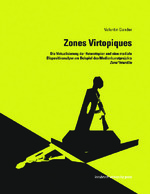Zones Virtopiques
Die Virtualisierung der Heterotopien und eine mediale Dispositivanalyse am Beispiel des Medienkunstprojekts Zone*Interdite
Author(s)
Dander, Valentin
Collection
AG UniversitätsverlageLanguage
GermanAbstract
How can Michel Foucault’s notion of heterotopias be transposed into a concept that describes medial and, more specifically, virtual spaces? What could such virtualized heterotopias look like? Can we find traces of utopian thinking within them? Zones*Virtopiques answers these questions in two ways: first by constructing a conceptual framework using notions of utopia and heterotopia, as well as reality and virtuality; and second, by applying theoretical findings to Zone*Interdite, a media art project on military areas authored by Mathias Jud and Christoph Wachter. Therefore, a micro-analysis of medial dispositifs has been developed. Wie kann Michel Foucaults Konzept der Heterotopien, der Anderen Orte, auf mediale und im Speziellen auf virtuelle Räume übertragen werden und wie könnten virtuelle oder virtualisierte Heterotopien aussehen? In welchem Verhältnis stehen Heterotopien zur Tradition utopischen Denkens? Und lassen sich insbesondere in virtualisierten Heterotopien Restbestände eines utopischen Impulses aufspüren? Diese Fragen nach dem common ground dieser speziellen (Nicht-)Orte (zones hétérotopiques, utopiques et virtuelles) sucht Zones Virtopiques auf zweifache Weise zu beantworten: Unter Bezugnahme auf kultur- und medienwissenschaftliche sowie auf sozial- und raumwissenschaftliche Theorien nähert sich der erste Teil des Buches entlang der Kategorien Realität/Virtualität und Utopie/Heterotopie dem frag-würdigen Gegenstand auf einer konzeptionellen Ebene. Der zweite Teil wendet die gewonnenen Erkenntnisse im Rahmen einer Mikroanalyse medialer Dispositive auf das Medienkunstprojekt Zone*Interdite von Mathias Jud und Christoph Wachter an.
Keywords
cirtual spaces; medienkunst; mediale räume; media art; sperrzone; medial spaces; virtuelleräume; heterotopie; heterotopy; michael foucault; Diskurs; Dispositiv; Dystopie; Michel Foucault; Utopie; VirtualitätDOI
10.26530/OAPEN_503847ISBN
9783902936530OCN
1166418953Publisher
innsbruck university pressPublisher website
https://www.uibk.ac.at/iupPublication date and place
2014Classification
The arts: general topics
Sociology and anthropology


 Download
Download Web Shop
Web Shop